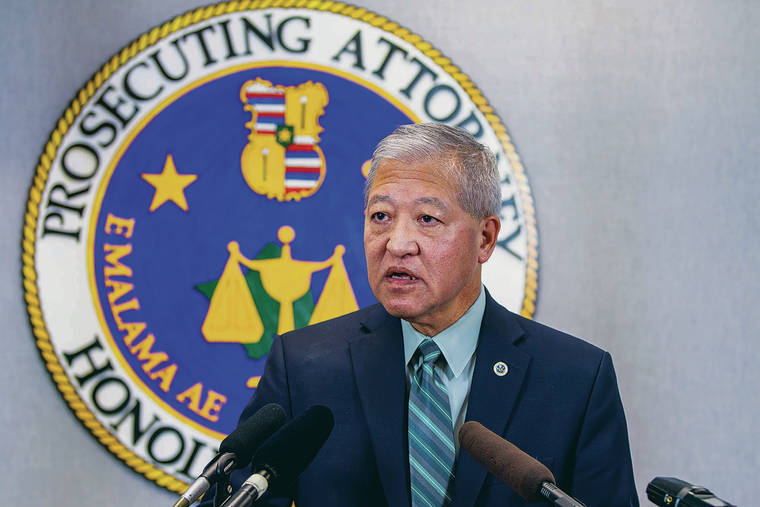Mayor Kirk Caldwell announced a year ago Opens in a new tabthat City Corporation Counsel Donna Leong was granted paid administrative leave from her post after receiving a target letter from the U.S. Department of Justice.
With no word from federal prosecutors about Leong’s status, Caldwell said he now is considering different “options” including the possibility of bringing Leong back to work for the city but not as corporation counsel, the city’s top civil attorney. Managing Director Roy Amemiya has been tasked to look at what capacity she could return, he said.
“It’s now been a year. We are looking at options,” the mayor told the Honolulu Star-Advertiser last week. “We understand the public’s concern about one of our employees who is on paid leave and, at the same time, we also are trying to balance the obligation of fairness to a respected and valued member of our administration in Donna Leong,” he said.
“There is due process. A target letter does not pre-suppose guilt,” said Caldwell, an attorney by trade. “We were hopeful that in a year’s time, we would have heard something by now and could get her back to work.”
Leong’s current job pays $171,336 annually under a 3.5% pay increase took effect July 1. Paul Aoki, her deputy, has been acting corporation counsel.
Caldwell said he does not know what role Leong could take and Amemiya has not been given a timeline for making a recommendation on her future. “I don’t want to speculate,” he said.
At the time the target letter was confirmed, both Caldwell and Leong attorney Lynn Panagakos said independently that the target letter sent to Leong is tied to the sweeping federal criminal investigation centered around former Police Chief Louis Kealoha and his wife, former Deputy Prosecutor Katherine Kealoha. They said the letter centered on Leong’s role in advising the Honolulu Police Commission on its agreement with Kealoha that allowed him to retire with full benefits and a $250,000 severance check in 2017.
Questions were raised about the HPD source of funding for the payment and who authorized it and among those asking were Kealoha’s successors and City Councilman Ron Menor. Then-Police Commission Chairman Max Sword, with Leong beside him, told reporters after the commission’s vote on the agreement that it was appropriate for the commission to take the action, although neither HPD brass nor the City Council approved the payout.
The two Kealohas, along with two former members of the police Criminal Intelligence Unit, were convicted in June on corruption charges tied to using their positions to frame Katherine Kealoha’s uncle for a crime he did not commit — the theft of the mailbox in front of the Kealohas’ then-Kahala home. The Kealohas are scheduled to be sentenced in March.
A stipulation in the agreement between the commission and Louis Kealoha said he was to return the money if he were convicted of a felony within six years, and the city has begun the process to do that.
The U.S Attorney’s Office in San Diego, which is coordinating the Honolulu cases, did not respond to the Star- Advertiser’s request for comment on Leong’s situation.
Meanwhile, city Prosecutor Keith Kaneshiro, Katherine Kealoha’s one-time boss, has been on paid administrative leave since March after he received a target letter believed to be tied to the Kealoha investigation.
Sandy Ma, executive director of government watchdog entity Common Cause Hawaii, said she’s not concerned about Leong’s paid leave status but found it troubling that Caldwell is looking to bring her back to Honolulu Hale.
“It seems like the mayor should be concerned with the appearance of ethical improprieties and ethical challenges that are ongoing in the administration,” Ma said. “Common Cause believes the chief focus should be on ethics, transparency and accountability instead of finding Ms. Leong another place within his administration with this pending legal matter.”
Ma added, “Understandably, she has a constitutional right — she is innocent until proven guilty.” However, federal prosecutors have now raised questions about the actions of people who’ve held the three most significant city law enforcement positions in the (offices of) police chief, prosecutor and corporation counsel, she said.
While recognizing that the chief is appointed by the Police Commission and the prosecutor is elected by Oahu voters, “we’re concerned that there’s an appearance of not putting ethics first,” Ma said.
Common Cause is not taking a position on whether Caldwell should allow Leong to stay in office while on leave from the corporation counsel’s position, Ma said.
Panagakos, Leong’s lawyer, meanwhile, declined to comment on the status of the investigation that’s tied to the target letter.
“It’s the U.S. Attorney’s investigation, it’s up to them to comment or not,” she said.
However, “based on my assessment of the evidence, (Leong) did not commit a crime,” she said. “I believe the payment was properly authorized and processed … I’m more convinced of that belief now than I was then based on the additional documents and research I’ve been able to do.”
Since Leong went on leave, 1st Deputy Corporation Counsel Paul Aoki has served as acting corporation counsel. Caldwell said that Aoki has been doing “a superb job” in Leong’s absence.




